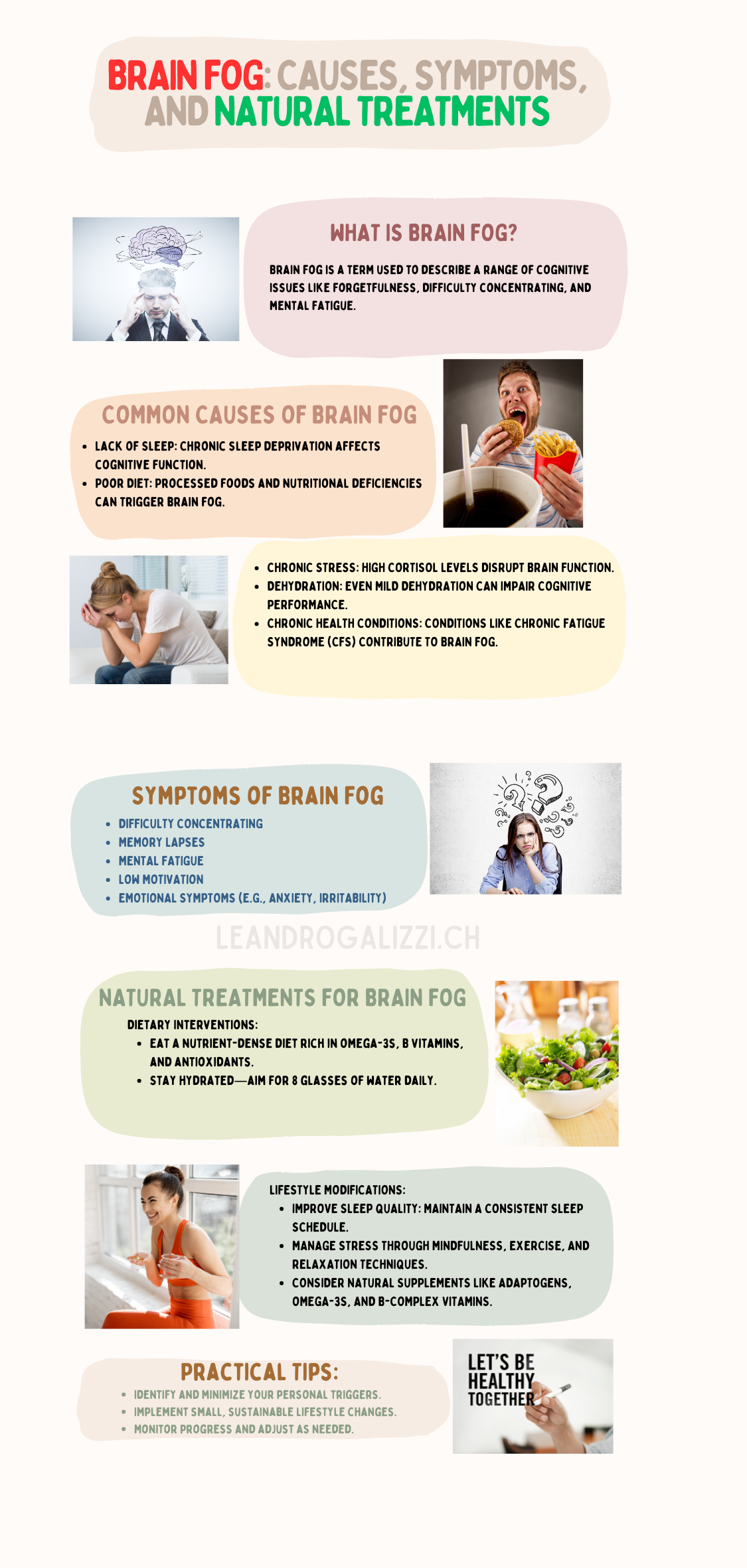Unraveling Brain Fog: A Comprehensive Guide to Its Triggers, Signs, and Holistic Treatments

- Understanding Brain Fog
- The Science Behind Brain Fog
- Holistic Treatments for Brain Fog
- Practical Tips for Daily Life
- Conclusion
Have you ever felt mentally sluggish, like your mind is wrapped in a thick fog? If so, you’re not alone. Many people experience what’s commonly known as “brain fog”—a term that describes a variety of cognitive issues such as difficulty concentrating, forgetfulness, and mental fatigue. While it’s not a medical condition in itself, brain fog can be a symptom of various underlying issues, impacting your productivity, mood, and overall quality of life.
In today’s fast-paced world, the pressures of work, family, and social commitments can lead to a lifestyle that inadvertently fuels brain fog. From poor diet and sleep habits to chronic stress and lack of exercise, a range of factors can cloud our thinking and dampen our mental clarity. Understanding what causes brain fog and how to treat it holistically can help you regain your mental sharpness and lead a more fulfilling life.
This comprehensive guide will delve into the causes, symptoms, and natural treatments for brain fog. We’ll explore the scientific basis behind this frustrating condition, identify common triggers, and offer practical, actionable solutions to help clear the fog from your mind.
Understanding Brain Fog
In this section, we’ll delve into the brain fog causes and treatments that can help you regain mental clarity.
What is Brain Fog?
Brain fog is a non-medical term often used to describe a feeling of mental confusion or lack of clarity. Those experiencing brain fog might struggle with memory recall, find it difficult to focus on tasks, or feel mentally exhausted even after minimal effort. It’s more than just occasional forgetfulness or tiredness; for many, it can significantly affect daily functioning and quality of life.
Scientifically, brain fog is associated with a range of cognitive symptoms that may stem from hormonal imbalances, inflammation, and other physiological factors. It is frequently described in medical literature as a type of cognitive dysfunction, and it is often linked to conditions such as chronic fatigue syndrome (CFS), fibromyalgia, and hormonal changes like menopause.
Common Triggers of Brain Fog
Recognizing the brain fog causes and treatments is the first step in managing this frustrating condition.
Poor Diet and Nutritional Deficiencies
What you eat has a direct impact on your brain function. Diets high in processed foods, refined sugars, and unhealthy fats can lead to inflammation, which affects cognitive function. Additionally, deficiencies in essential nutrients like omega-3 fatty acids, B vitamins, and magnesium can impair neurotransmitter production, leading to symptoms of brain fog.
Lack of Sleep
Sleep is essential for brain health, playing a crucial role in memory consolidation, toxin removal, and the regulation of mood and energy levels. Chronic sleep deprivation or poor-quality sleep can lead to cognitive decline, manifesting as brain fog. Experts recommend that adults aim for 7-9 hours of quality sleep each night to maintain optimal cognitive function.
Chronic Stress and Hormonal Imbalances
Stress is a major contributor to brain fog. When you’re stressed, your body produces higher levels of cortisol, a hormone that can disrupt the balance of other hormones such as serotonin and dopamine, which are essential for mood regulation and cognitive function. Over time, chronic stress can lead to hormonal imbalances that exacerbate feelings of mental cloudiness and fatigue.
Dehydration and Lack of Physical Activity
Your brain is approximately 75% water, so it’s no surprise that dehydration can impair cognitive function. Even mild dehydration can cause issues like difficulty concentrating, confusion, and slower cognitive processing. Additionally, physical activity boosts blood flow to the brain and promotes the release of endorphins, which can help clear brain fog.
Chronic Health Conditions
Conditions like Chronic Fatigue Syndrome (CFS), Postural Orthostatic Tachycardia Syndrome (POTS), and autoimmune disorders can contribute significantly to brain fog. These conditions often involve systemic inflammation, poor blood circulation, and hormonal imbalances, all of which can affect cognitive clarity and lead to persistent brain fog.
Symptoms of Brain Fog
The symptoms of brain fog can vary widely, but they generally include:
- Difficulty Concentrating: Struggling to stay focused on tasks or conversations.
- Memory Lapses: Forgetting information that you would typically remember easily.
- Mental Fatigue: Feeling mentally exhausted even after minor mental tasks.
- Low Motivation: A lack of enthusiasm or drive to complete tasks or pursue goals.
- Emotional Symptoms: Increased irritability, anxiety, or mild depression often accompany brain fog.
The Science Behind Brain Fog
Physiological and Neurological Factors
Brain fog is often a symptom of underlying physiological and neurological issues. One of the most common causes is inflammation, which can be triggered by factors such as poor diet, chronic stress, and exposure to environmental toxins. Inflammation affects the brain’s ability to function optimally, leading to cognitive impairments like those seen in brain fog.
Hormonal imbalances also play a crucial role. Cortisol, known as the “stress hormone,” is essential for energy and focus, but chronic high levels can disrupt the balance of other hormones such as serotonin and dopamine. These neurotransmitters are vital for maintaining mood, motivation, and cognitive clarity. An imbalance can lead to symptoms of brain fog, as well as increased risk for anxiety and depression.
Another key factor is blood flow and oxygenation. The brain requires a constant supply of oxygen and nutrients, which are delivered through blood circulation. Conditions that impair blood flow, such as dehydration or cardiovascular issues, can result in reduced oxygen supply to the brain, leading to cognitive difficulties commonly associated with brain fog.
Research Findings and Studies
Research into brain fog has shed light on its complex nature. Studies have found that individuals with chronic conditions like Chronic Fatigue Syndrome (CFS) often experience significant cognitive impairments. For instance, a study published in the *Journal of Clinical Autonomic Research* reported that CFS patients frequently describe their cognitive symptoms as “brain fog,” highlighting issues such as memory lapses, difficulty concentrating, and mental fatigue.
Functional MRI (fMRI) studies have also shown that people experiencing brain fog, particularly those with chronic health conditions, often require increased brain activation to perform cognitive tasks. This suggests that brain fog may be linked to inefficient brain function, where more brain resources are required to achieve the same level of performance as healthy individuals.
Furthermore, dietary studies have demonstrated that nutrient deficiencies, particularly in omega-3 fatty acids and B vitamins, are linked to cognitive decline and symptoms of brain fog. Addressing these deficiencies through diet or supplementation can significantly improve mental clarity and overall cognitive function.

Holistic Treatments for Brain Fog
Addressing brain fog requires a holistic approach that focuses on improving your overall health and well-being. While it’s important to tackle any underlying medical conditions, there are several natural and lifestyle-based strategies you can adopt to clear the mental haze. Below are some effective holistic treatments for brain fog.
Dietary Interventions
Eating a Balanced, Nutrient-Dense Diet
What you eat directly impacts your brain function. A diet rich in whole foods, including plenty of fruits, vegetables, lean proteins, and healthy fats, provides the essential nutrients your brain needs to function optimally. Omega-3 fatty acids, found in fish like salmon and flaxseeds, are particularly important for brain health as they support cognitive function and reduce inflammation. Additionally, B vitamins, found in leafy greens, eggs, and legumes, play a key role in maintaining energy levels and supporting neurotransmitter function.
On the other hand, processed foods, refined sugars, and unhealthy fats can exacerbate inflammation and contribute to cognitive decline. Reducing your intake of these foods and focusing on a nutrient-dense diet can significantly improve symptoms of brain fog.
Importance of Hydration
Staying hydrated is crucial for maintaining cognitive function. Even mild dehydration can impair attention, memory, and other cognitive processes. Aim to drink at least eight glasses of water a day, and increase your intake if you are physically active or live in a hot climate. Incorporating foods with high water content, like cucumbers, watermelon, and oranges, can also help you stay hydrated.
Lifestyle Modifications
Improving Sleep Quality
Sleep is fundamental to brain health. During sleep, the brain consolidates memories, clears out toxins, and recharges its cognitive resources. Poor sleep quality or insufficient sleep can lead to increased cortisol levels, which can further exacerbate brain fog. To improve sleep quality, establish a regular sleep routine by going to bed and waking up at the same time each day. Additionally, create a restful sleep environment by keeping your bedroom cool, dark, and free of electronic devices.
If you struggle with sleep, consider natural sleep aids like melatonin or magnesium supplements, but always consult with a healthcare provider before starting any new supplement regimen.
Stress Management Techniques
Chronic stress is one of the most significant contributors to brain fog. High levels of cortisol can disrupt brain function and lead to mental fatigue. Incorporating stress management techniques into your daily routine can help reduce cortisol levels and improve mental clarity. Practices such as mindfulness meditation, deep breathing exercises, and yoga are effective ways to manage stress and enhance cognitive function.
Physical activity is also a powerful stress reliever. Regular exercise increases endorphins, the brain’s natural feel-good chemicals, and improves blood flow to the brain. Aim for at least 30 minutes of moderate exercise, like walking or cycling, most days of the week to help clear brain fog.
Natural Supplements and Herbs
Adaptogens
Adaptogens are herbs that help the body adapt to stress and restore balance. Ashwagandha, holy basil, and Rhodiola rosea are popular adaptogens that have been shown to lower cortisol levels and support cognitive function. These herbs can be taken as supplements or enjoyed as teas to help manage stress and reduce brain fog.
Omega-3 Fatty Acids
Omega-3 fatty acids, particularly EPA and DHA, are essential for brain health. They reduce inflammation, support neurotransmitter function, and improve cognitive performance. Omega-3 supplements, such as fish oil or algae oil, can be beneficial if your diet is low in these important fats. Regular consumption of omega-3-rich foods like fatty fish, walnuts, and chia seeds can also help boost brain function.
B Vitamins
B vitamins, especially B6, B12, and folate, play a crucial role in brain health. They are involved in the production of neurotransmitters and the maintenance of healthy nerve cells. Deficiencies in B vitamins have been linked to cognitive decline and mental fatigue. Taking a B-complex supplement or increasing your intake of B-vitamin-rich foods like eggs, dairy, and leafy greens can help alleviate brain fog.
Potential Benefits of Nootropics
Nootropics, often referred to as “smart drugs,” are substances that may enhance cognitive function. Some natural nootropics, such as Ginkgo biloba and Bacopa monnieri, have been studied for their potential to improve memory, focus, and mental clarity. While research is still ongoing, these supplements may offer benefits for those struggling with brain fog. As with any supplement, it’s important to consult with a healthcare provider before starting a new regimen.
Addressing Underlying Health Conditions
Brain fog can often be a symptom of underlying health conditions such as thyroid imbalances, autoimmune disorders, or chronic fatigue syndrome. It’s essential to work with a healthcare professional to identify and manage any medical conditions that may be contributing to your cognitive issues. Functional medicine approaches, which focus on identifying and treating the root causes of health problems, can be particularly effective in addressing complex conditions that contribute to brain fog.
For a more detailed understanding of how diet and lifestyle can impact brain health, consider exploring additional resources such as [this comprehensive guide on nutritional support for cognitive function](https://www.healthline.com/nutrition/ways-to-improve-brain-function).
Practical Tips for Daily Life
Dealing with brain fog can be frustrating, but incorporating small, sustainable changes into your daily routine can make a significant difference. Here are some practical tips to help you manage brain fog and improve your cognitive function:
- Create a Brain Fog Prevention Plan: Start by identifying your personal triggers, whether they are related to diet, sleep, stress, or other factors. Once you know what exacerbates your brain fog, you can develop a plan to minimize these triggers. This might include dietary changes, improved sleep hygiene, or stress management techniques.
- Implement Small, Sustainable Changes: Rather than overhauling your entire lifestyle overnight, focus on making gradual changes that you can stick with. For example, try adding one serving of leafy greens to your diet each day or setting aside 10 minutes each morning for mindfulness meditation.
- Monitor Progress and Adjust as Needed: Keep track of your symptoms and any changes you’ve made to your routine. This will help you determine what’s working and what isn’t, allowing you to make necessary adjustments. Consider keeping a journal where you log your sleep patterns, dietary habits, and stress levels, alongside notes on your cognitive function and mood.
- Stay Physically Active: Regular exercise is key to maintaining mental clarity. Aim to incorporate a mix of aerobic activities, strength training, and flexibility exercises into your routine. Physical activity not only boosts brain health but also helps regulate sleep, reduce stress, and improve overall well-being.
- Connect with Others: Social interactions are vital for mental health. Make time to connect with family, friends, or community groups. Engaging in meaningful conversations and activities with others can help stimulate your mind and lift your mood, reducing feelings of brain fog.
Conclusion
Brain fog can feel like a daunting challenge, but it is not insurmountable. By understanding the underlying causes and implementing holistic treatments, you can begin to clear the mental haze and regain your cognitive clarity. Remember, improving brain fog is a journey that involves making mindful choices about your diet, lifestyle, and overall health.
As you work to unravel the causes of your brain fog, stay patient and consistent with your efforts. The changes you make today can lead to a sharper, more focused mind tomorrow. If you continue to struggle with brain fog despite making lifestyle adjustments, consider seeking guidance from a healthcare professional to explore any underlying health issues that may need to be addressed.
We hope this comprehensive guide has provided you with valuable insights and actionable steps to combat brain fog. Don’t let the fog hold you back—start taking control of your mental clarity today.
Consider reaching out to a nutritionist or functional medicine practitioner if you need personalized advice on managing brain fog. These professionals can help tailor a plan that addresses your specific needs and health goals.
References:
2. Stewart, J. M., Ocon, A. J., et al. (2012). The effect of mental and orthostatic stress on cerebral blood flow in chronic fatigue syndrome. Frontiers in Physiology. doi:10.3389/fphys.2013.00063
3. Levy, J. (2023). Brain Fog Causes, Symptoms + Natural Treatments.
4. Lange, G., et al. (2004). Objective evidence of cognitive complaints in Chronic Fatigue Syndrome: a functional magnetic resonance imaging study of working memory. NeuroImage, 26(3), 857-866.
5. Patrick, R. P., & Ames, B. N. (2015). Vitamin D and the omega-3 fatty acids control serotonin synthesis and action, part 2: relevance for ADHD, bipolar disorder, schizophrenia, and impulsive behavior. FASEB Journal, 29(6), 2207-2222.
6. Panossian, A., & Wikman, G. (2010). Effects of adaptogens on the central nervous system and the molecular mechanisms associated with their stress—protective activity. Pharmaceuticals, 3(1), 188-224.





